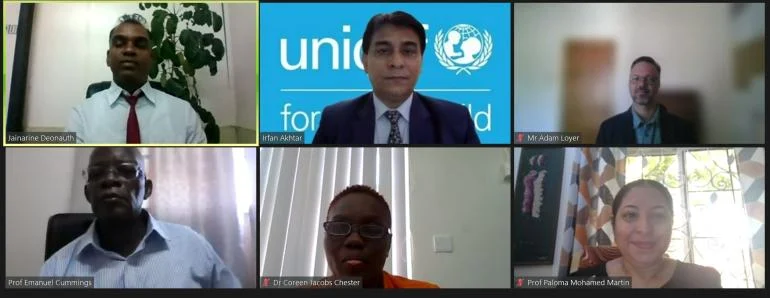Anthropologist, author, and University of Guyana lecturer Dr. Kumar Mahabir recently presented a research paper at the Anton de Kom University in Suriname on the case for reparations for indentured servitude in the Caribbean and the wider Indian Diaspora.
The paper was presented in person at the international conference on Slavery, Indentured Labour, and Their Impact on Present Societies.
The conference was organised by the History Department of the Faculty of Humanities, in collaboration with the Faculty of Graduate Studies and Research (FGSR), the Faculty of Social Sciences, the Social Science Research Institute (IMWO) of the Anton de Kom University of Suriname, and the Directorate of Culture. (Ministry of Education, Science, and Culture). Mahabir presented a compelling case for reparations for Indian indentureship. The arrival of Sir John Gladstone’s family in Guyana two weeks ago, which marked a significant moment in history, came after his presentation.
The family expressed their sincere apologies for their ancestor’s direct involvement in both slavery and indentureship in the Caribbean country. John Gladstone was the father of four-time British Prime Minister, William Gladstone. In the year 1838, John Gladstone played a pivotal role in introducing a workforce of Indian indentured laborers to Guyana that was intended to supplant the previously enslaved Africans.
He owned several sugarcane plantations in then British Guiana – Demerara as it was called—on which slaves, and later indentured laborers worked, the largest of which were the Vreedenhoop and Belmont estates. Historical records indicate that John Gladstone was also associated with the ownership of two vessels responsible for the transportation of exploited laborers from India. These laborers were engaged in indentured servitude as a result of the abolition of slavery in 1834.
In a move towards reparatory justice, the Gladstone family announced their intention to contribute £100,000 to the University of Guyana’s International Institute for Migration and Diaspora Studies, inaugurated at that historic event. The family also made a commitment to allocate funding towards various unnamed projects in Guyana and the University of London’s Centre for the Study of the Legacies of British Slavery, both for five years.
The hope is that a fair sum of this money would go to the study of indentureship, which would also benefit Indian lecturers and students at the university, as well as fund projects in Indian communities in Guyana. The following is Mahabir’s abstract: “In 1838, the first shipload of Indian indentured laborers to be brought to the Caribbean set foot in British Guiana.
Over the next 80+ years, over half a million more would come, distributed to various colonies throughout the region to work on the colonial sugar plantations. Post-slavery indentureship was described by historian Hugh Tinker as a “new system of slavery”, it being a deceptive system riddled with abuse and exploitation.
Amidst the calls for reparations being made in recent years by the descendants of enslaved Africans and indigenous peoples, the descendants of indentured Indians are also starting to make their voices heard and recognized.
However, the argument in favor of reparations for indentured peoples, specifically Asian Indians who made up the vast majority of post-slavery indentured laborers, is less straightforward than it is for the victims of slavery and indigenous genocide.
“In a recent Zoom public meeting of May 22, 2022, on the topic ‘Should Indians in the Diaspora demand reparation for indentureship?
Dr Hilary Brown, Program Manager of Culture and Community Development at the CARICOM Secretariat, posed the question: “There are established definitions of what constitutes a crime against humanity. And so that includes enslavement, genocide, dehumanization….
Can we also classify indentureship as a crime against humanity, and in the dialogue, then, where does it fit?” This paper will look at the impact that indentured servitude had in the Caribbean and interrogate the justifications for the descendants of indentured laborers to receive reparations.”












